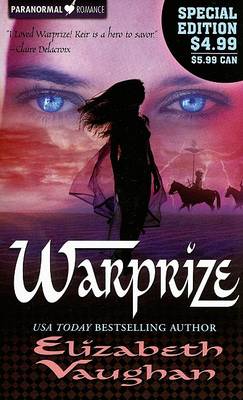
Kate (Blogging with Dragons)
Written on Jul 24, 2018
We are first introduced to our first-person narrator, Xylara in the healer’s tent, where she struggles to tend to the wounds of a dying man. Xylara, is the Daughter of Xy or the Daughter of Blood—terms which essentially mean she is a princess. She defied her late father, the King, to become a Master Healer and has no political ambitions of her own, dreaming only of opening her own school of healing. At first I thought her determination to be a healer was pretty awesome, especially when Xylara, affectionately called Lara, defied her despotic half-brother and current King Xymond, to heal their prisoners of war. But unfortunately, I quickly learned that Lara obsesses over healing, and is not concerned with much else, which made reading her first-person thoughts quite boring.
And her saint-like aspirations do not end with healing, Lara agrees to become the Warprize of the Firelanders, in order to stop war between the two peoples. Believing herself to be a slave to the Warlord Keir, Lara leaves her homeland with nothing more than the clothes that Keir gave her, learning that she must take nothing from the hand of anyone save the Warlord. How annoyingly sexist. Surprised to not be raped by the Warlord or to be a slave after all, Lara is so grateful that she starts falling for Keir, which seems more like Stockholm Syndrome than anything else—despite his good treatment of her when they actually interact. Regardless, Lara establishes a healing tent to care for her new people, who refuse to refer to her as anything but Warprize.
It is not until page 240 of the book and about 2/3s of the way in, that we learn what the title of Warprize actually means, and frankly, it is kind of ridiculous:
“…Our traditions tell us that there is yet another treasure that a warlord can obtain in battle. That is a warpize. A warpize must be discovered during the course of a battle, or on or near a battlefield. A warprize must render aid to the warlord, must spark feelings of desire. It is said that the attraction between warlord and warpirze is as the heat of the sun that shines in the height of summer.”
Putting aside how weird their requirements are for obtaining a Warprize, I definitely did not feel any substantial romantic tension between Lara and Keir. It was more like, “oh, this is my role now as Warprize. So, I’m going to go jump into bed with him and then explain that I never felt this kind of love for anyone before, even though I barely know him!”
The first-person narration extremely stinted the development of these characters and their romances. Because Lara is very single-minded with the healing, we don’t find out much about the other characters, especially Keir, for whom she manages to fall despite virtually not knowing him or even spending time with him, as he is always off on Warlord business. As such, I was pretty indifferent to what happened to the characters. As the preview of the next book showed Lara is overly concerned that Keir has lost interest in her because he was leading his army and hasn’t seen her for only two days, I am not inclined to pick up the next book. This kind of insecurity and neediness is not the kind of development I want in my heroines, who I prefer to be strong and self-reliant, even when in love.
I also could not help but notice that the description of the Firelanders and their near-worship of their horses was quite similar to the Dorthraki in A Song of Ice and Fire. I found that Lara’s being given away by her brother to what is considered a barbaric people, and to a notorious Warlord known for his battle prowess, also extremely comparable to Danaerys’s situation, when she is given to Khal Drogo, by her sinister brother, Viserys. I was dismayed by these similarities. Perhaps I could have forgiven these likenesses, if Warprize had actually improved upon the story and writing of A Song of Ice and Fire, but it does not. And Lara is certainly no Danaerys, with her love not being even close to on the level of that Danaerys and Khal Drogo’s. I could not help but think Warprize was a mere cheap imitation of A Song of Ice and Fire.
The rest of the plot similarly reads like dozens of others as well. We have the typical perfect King and father that dies, leaving his saintly daughter in the clutches of her evil, maddened brother. It is only when she is whisked away by prince charming that she finds where she truly belongs. It is one thing if this type of story is done with tons of character development, mysteries and revelations, but that is just not the case in Warprize.
Though the novel does have its moments, they were just too few and far apart. I liked Lara’s determination to get back Keir and to remain his Warprize after her coronation as Queen of Xy following the murder of her brother. However, I did not like that this motivation to fulfill her duties as Queen and to look for a solution to the political issues surrounding Xy and the Firelanders, only came after someone literally slapped some sense into her weepy self. Ugh. And then, her solution is to walk through the desert to catch up with her man—BAREFOOT—because she can’t take anything from anyone who isn’t her Warlord, even though she is now a queen. This whole law was so ridiculous to me throughout the novel, and her adherence to it especially so, that I felt no sympathy for her when her feet were injured and infected as a result.
Warprize does try to develop the culture of the Firelanders, but it just isn’t enough to make up for the lack of world building. Tellingly, there is no map in the beginning of the book, something quite common in fantasy novels. The readers learn nothing more about other countries, cultures, or peoples—only that of the Firelanders, and somewhat of Xy. We witness the differences in worship between Xy—who worship the Goddess and God , which horrifies the Firelanders who can’t believe the Xy worship what they see as people—a fancy “pattern” dance by the Firelanders, and a Firelander meeting where a “token” is held for safety in truth telling. But really, that’s the whole extent of the world-building, with hints of warpriests and magic thrown in every once in awhile, which feels more like a tease than actual development.
Warprize just did not work for me as a whole. There were times I did not even want to finish it at all, but I pushed through for curiosity’s sake. I really do not feel any need to read the other novels in the book, as I missed the originality, world-building, and character development of other fantasy novels. I also really did not enjoy the first person character story-telling either. If you are just dipping your toes into fantasy or romance, or do not mind first-person narratives, you may enjoy this book. But as a person used to reading epic fantasy novels, it was a disappointing read.
Book Review Policy
Connect with Me:


